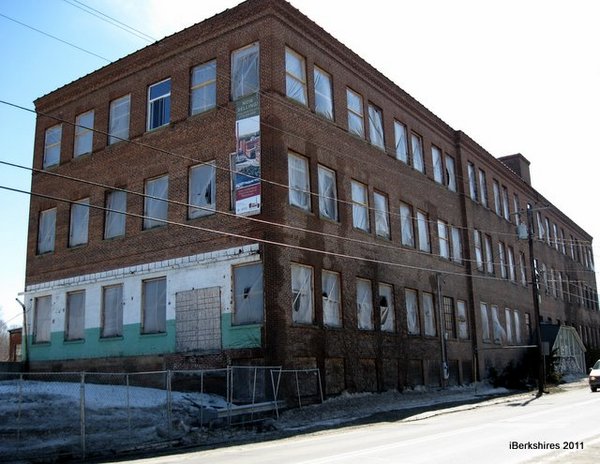Williamstown Cable Project Has Key Permits In Place

WILLIAMSTOWN, Mass. — The long-delayed conversion of the former Cable Mills factory to condominiums does not face any significant delays on the permitting front that would hold up an anticipated construction start this spring.
Last month, the director of development for Mitchell Properties, owner of the Water Street complex, told the town's Community Preservation Committee that Mitchell hoped to break ground in spring 2014 if it received funding in this month's round of Massachusetts affordable housing tax credits.
As hoped, the Williamstown project made the cut when Gov. Deval Patrick on Thursday released a list of projects in 17 communities around the commonwealth, including $1.3 million in bond subsidies for Cable Mills.
Friday morning, Williamstown's town manager confirmed that Mitchell faces only minor regulatory hurdles before starting the renovation.
"The key zoning permits are in place," Fohlin said. "They will need routine building permits."
Likewise, Mitchell Properties does not anticipate any problems finding occupants for the 61 units — including 13 units of affordable housing — it plans for the site.
"We still have people every week contacting us about buying into Cable Mills," David Traggorth told the CPC last month. "There's just a lot of people who understand what this can be and have the vision."
The vision has changed slightly since developer Robert Kuehn purchased the property a decade ago.
Kuehn planned on developing condominiums on the site, and Mitchell Properties had the same idea in mind when it acquired Cable Mills from Kuehn's estate in 2007. The project first began permitting in 2004.
But the new financing package created after the economic crisis of '07 includes historic preservation tax credits that preclude the sale of individual units for a period of five years after occupancy, Traggorth said.
"It's in the federal legislation," he told the CPC. "It says ownership cannot change [for five years]. They want to make sure the building stays operating and is cared for in a historic manner for some period of time."
So now Mitchell plans to rent the 61 units as apartments before converting them to condos.
The 13 "affordable" or subsidized housing units will remain priced according to a percentage of the area median income in perpetuity. In addition to the state affordable housing financing announced Thursday, the $26 million project is utilizing $1.5 million in town money generated by taxation under the Community Preservation Act. Town meeting OK'd the funding in 2007.

The town has approved a 2 percent real estate tax surcharge (after the first $100,000) under the CPA to support historic preservation, community housing and open space and recreation.
If Cable Mills breaks ground in the spring, it will be the third major construction project in town. Both the Clark Art Institute expansion and the Stetson-Sawyer Library project at Williams College are entering their final phases with anticipated completion in summer 2014.
Fohlin said Friday the town does not anticipate any problems with construction vehicles parking in the residential neighborhoods just west of Water Street, or Route 43. Nor does he expect those vehicles to displace any cars that currently use the former town garage site, a vacant lot located just north of Cable Mills on the other side of Water Street.
"The Cable Mills site has much more parking capacity than 59 Water St.," Fohlin said. "I don't expect any need for Cable Mills construction vehicles to be parking in the town lot."
Fohlin was pleased to see Kuehn's vision for Cable Mills move a step closer to fruition.
"Bob Kuehn was a gentle giant of a man in both stature and character," Fohlin said. "He was known statewide for his personal commitment to affordable housing and his work with Citizens' Planning and Housing Association. He is recognized as a key architect of the Community Preservation Act. And he was an avid fisherman.
"He suffered a fatal heart attack at his desk reviewing plans for Cable Mills. It is the singular disappointment of my years in Williamstown that we were not able to work together longer."
Williamstown's Cable Mills Receives State Bond Subsidy
WILLIAMSTOWN, Mass. — The Cable Mills project appear to have received the impetus to get it finally off the drawing board.
The Water Street housing development was among two dozen identified by the Department of Housing and Community Development to receive some $73 million in affordable housing resources and tax credits.
David Traggorth, director of development for owner Mitchell Properties, told the Community Preservation Committee in October that should the state support come through, he expected to have shovels in the ground this spring.
Traggorth expected to get $1.3 million toward the $26 million project; however, the announcement of the funding did not include amounts.
Cable Mills' 61 units, of which 13 will be "affordable," will receive state support in the former bond subsidies, as well as more than a $1 million from the town of Williamstown through Community Preservation Act funds.
The announcement was made at the Putnam Square Apartments project in Cambridge by Gov. Deval Patrick on Thursday, after signing H.3492, "An Act Financing the Production and Preservation of Housing for the Low and Moderate Income Residents."
The bill provides a total of $1.4 billion over five years for 11 capital funding programs that rehabilitate and modernize state-assisted public housing; preserve the affordability and income mix of state-assisted multifamily developments; and support homeownership and production of rental housing opportunities for low and moderate income residents, elderly, persons experiencing homelessness, persons with disabilities and veterans.
"Creating or preserving affordable housing helps to generate jobs, grow local businesses and strengthen our communities," said Patrick in a statement. "Government's role is to help people help themselves, and sustainable affordable housing will create growth and opportunity in our communities that will last for generations to come."
Tags: affordable housing, Cable Mills, permitting,















